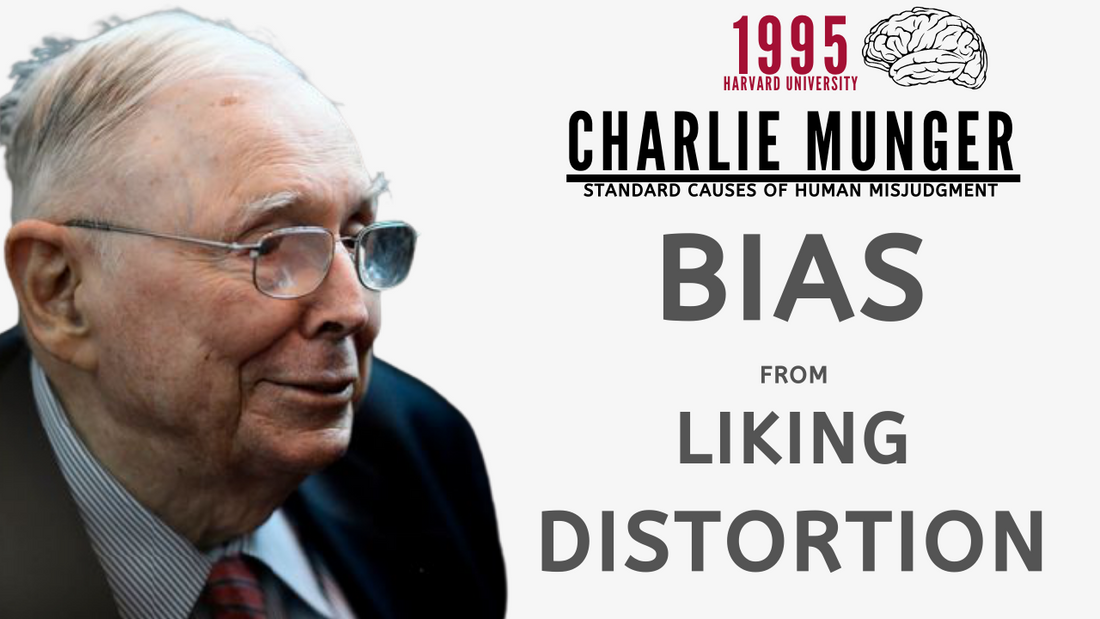
Charlie Munger on Bias from Liking Distortion. | Harvard University 1995【C:C.M Ep.84】
[Transcript]
CHARLIE MUNGER: Bias from liking distortion, including the tendency to especially like oneself, one’s own kind, and one’s own idea structures, and the tendency to be especially susceptible to being misled by someone liked.
Disliking distortion. Bias from that. The reciprocal of liking distortion and the tendency not to learn appropriately from someone disliked. Well, here again, we’ve got hugely powerful tendencies, and if you look at the wars in part of the Harvard Law School as we sit here, you can see those very brilliant people get into this almost pathological behavior, and these are very, very powerful, basic, subconscious, psychological tendencies or at least partly subconscious.
Now let’s get back to B.F. Skinner, man with a hammer syndrome revisited. Why is man with a hammer syndrome always present? Well if you stop to think about it, incentive caused bias. His professional reputation is all tied up with what he knows. He likes himself, and he likes his own ideas, and he’s expressed them to other people, consistency and commitment tendency. I mean you’ve got four or five of these elementary psychological tendencies combining to create this man with a hammer syndrome.
Once you realize that you can’t really buy your thinking down. Partly you can, but largely you can’t in this world. You’ve learned a lesson that’s very useful in life. George Bernard Shaw said, and a character say in The Doctor’s Dilemma, “In the last analysis, every profession is a conspiracy against the laity.” But he didn’t have it quite right because it’s not so much conspiracy as it is a subconscious, psychological tendency.
The guy tells you what is good for him, and he doesn’t recognize that he’s doing anything wrong any more than that doctor did when he was pulling out all those normal gallbladders. And he believed that his own idea structures will cure cancer, and he believed that the demons that he’s the guardian against are the biggest demons and the most important ones. And in fact, they may be very small demons compared to the demons that you face. So you’re getting your advice in this world from your paid advisor with this huge load of ghastly bias. And woe to you!
And only two ways to handle it. You can hire your advisor and then just apply a windage factor like I used to do when I was a rifle shooter. I’d just adjust for so many miles an hour wind. Or you can learn the basic elements of your advisor’s trade. You don’t have to learn very much, by the way, because if you learn just a little and you can make him explain why he’s right. And those two tendencies will take part of the warp out of the thinking you’ve tried to hire down.
By and large, it works terribly. I have never seen a management consultant’s report in my long life that didn’t end with the following paragraph: “What this situation really needs is more management consulting.” Never once! I always turn to the last page. Of course, Berkshire Hathaway doesn’t hire them, so … I only do this in sort of a lawyer-istic basis. Sometimes I’m in a nonprofit where some idiot hires one.
(Source: https://youtu.be/07f8oasWqWg)
[YAPSS Takeaway]
The reciprocal of liking distortion and the tendency not to learn appropriately from someone disliked. ~Charlie Munger
Also sometimes, misled by someone you liked.
